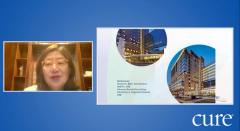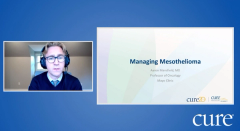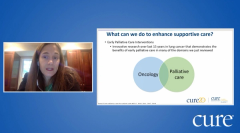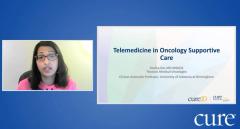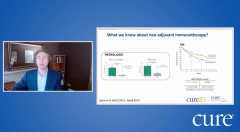
Educated Patient® Lung Cancer Summit Antibody Drug Conjugates Presentation: October 1, 2022
Watch Dr. David Gerber, from UT Southwestern Medical Center, discuss antibody drug conjugates during the CURE Educated Patient Lung Cancer Summit.
Episodes in this series

Antibody drug conjugates offer oncologists a novel way to deliver chemotherapy directly to cancer cells, leading to fewer side effects for patients with lung cancer, explained Dr. David Gerber.
Gerber, who is a professor in the department of internal medicine at UT Southwestern Medical Center in Dallas, recently gave an overview of the role of antibody drug conjugates in lung cancer treatment at CURE®’s Educated Patient® Lung Cancer Summit.
“An antibody drug conjugate is a treatment that combines a monoclonal antibody and a chemotherapy drug,” Gerber explained in an interview with CURE®. “By attaching chemotherapy to an antibody, the chemotherapy can be delivered more specifically to the target. This means more chemotherapy getting to cancer and less going to normal tissue. As a result, (antibody drug conjugates) may have less toxicity than conventional chemotherapy drugs.”
Antibody drug conjugates work by going after a certain expression or target that is found on some cancer cells. They stay intact while moving throughout the bloodstream, limiting the amount of chemotherapy that is released in healthy tissue. Once they find the target on the cancer cells, they enter the cells and release chemotherapy.
Some key cancer characteristics for antibody drug conjugates to work, according to Gerber include:
- The target of the drug is highly expressed on the tumor cells;
- There is little, if any, expression of the target on healthy cells, and
- It is given with a highly potent drug.
“(Antibody drug conjugates) represent an entirely new class of treatment for lung cancer,” Gerber said. “They do not take place of existing chemotherapy, targeted therapy or immunotherapy regimens, but rather can be added to the growing list of available options for patients.”
In August 2022, the
“Currently, only a small proportion of lung cancer cases have the qualifying ‘target’ to receive the first antibody drug conjugate approved for lung cancer earlier this year,” Gerber said, highlighting a need for further research. “The (better) targets we have, the more patients are eligible to receive (antibody drug conjugates), and the greater the number of (antibody drug conjugates) an individual patient may receive (during) the course of his or her treatment.”
Gerber mentioned that while antibody drug conjugates tend to induce high response rates at first, the cancer cells oftentimes end up developing resistance, meaning that they stop responding to treatment.
“In the future, we are likely to see more of these drugs approved, and we are hopeful that future research will also improve the efficacy of these treatments,” Gerber said.
For more news on cancer updates, research and education, don’t forget to

